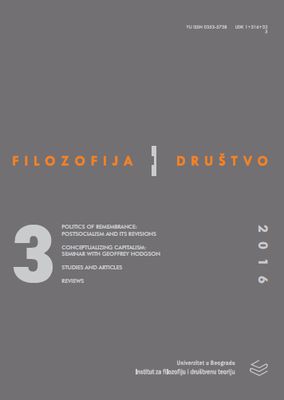
Alex Gourevitch, From Slavery to the Cooperative Commonwealth
Alex Gourevitch, From Slavery to the Cooperative Commonwealth - Labor and Republican Liberty in the Nineteenth Century, Cambridge University Press, New York, 2015
More...We kindly inform you that, as long as the subject affiliation of our 300.000+ articles is in progress, you might get unsufficient or no results on your third level or second level search. In this case, please broaden your search criteria.

Alex Gourevitch, From Slavery to the Cooperative Commonwealth - Labor and Republican Liberty in the Nineteenth Century, Cambridge University Press, New York, 2015
More...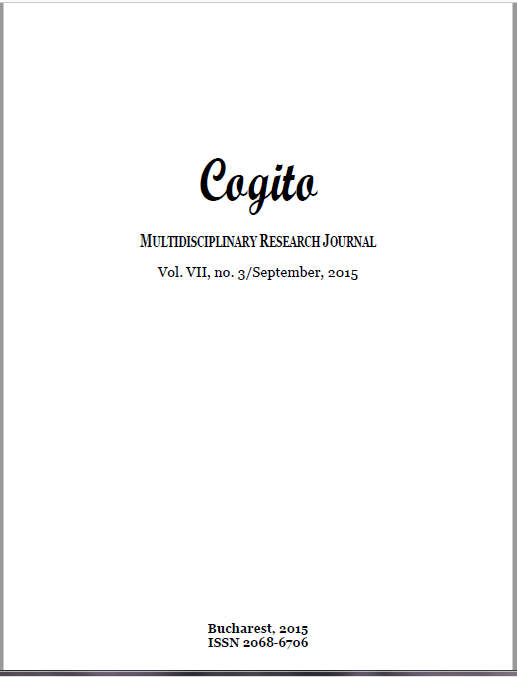
The European Union is facing for a decade now a multitude of crises and challenges, that put to the test its identity and stability. Some crises have internal sources, like the Euro-zone crisis and the crisis in Greece, others are generated by external causes, like the conflict in Ukraine, the threat of terrorism and, more recently, the crisis of the immigrants now underway. The Euro-zone crisis was a true test of strength for the European project, having as consequences a lower public confidence in European institutions and deeper economic discrepancies among the Member States. These days, Europe needs to find urgent solutions in order to manage the sensitive issue of the huge number of immigrants from the Middle East and Africa. It is a more complex crisis than others, with serious humanitarian and social components, but one that will have profound implications on the cultural identity of Europe.
More...
This paper addresses the link between level and structure of Romanian local government expenditures and electoral cycle, as well as spending interactions among Romanian municipalities. We have obtained the research results using general linear models with cross fixed- effects and time fixed- effects. We have also included mayors’ political affiliation and some socio-economic factors in the proposed models. We have noticed increased public spending during election years, preceded and respectively followed by decreased spending in pre- and post- election years. Others findings revealed that mayors’ political affiliation, other local administrative units’ public spending policies and some socio- economic factors have had a significant influence upon Romanian municipalities’ public expenditures.
More...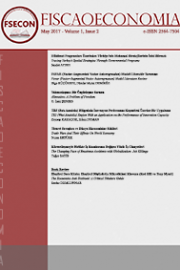
This study evaluates the freedom/emancipation problem in a way based on the fact of alienation. Marx’s philosophical and historical approach is essential for this evaluation given the fundamental emphasis on alienation. Two figures who agitated Marx are important to comprehend Marx’s intellectual improvement; these are Hegel, in relation with spiritual progress, and Feuerbach, in relation with religion. Marx criticizes both and apprehends to alienation deriving from production activities and labor process, and, most critically, he emphasizes the historical mode of production that sets the framework of alienation. This concrete analysis facilitates to overcome alienation, and, after all, freedom/emancipation issue and the communism idea are discussed and affirmed this basic relationship.
More...
The present article researches theoretic and methodological regularities of the labor relations genesis in the process of evolution of social and economic systems. The approach developed by the authors allows allotting basic blocks of the labor relations system taking into account operating subjects and objects of the relations. Taken as the basis, such approach allows describing labor relations of any economic system. The allotment of mandatory elements (objects) and subjects in the structure of labor relations allows revealing the content of the “labor relations” category.
More...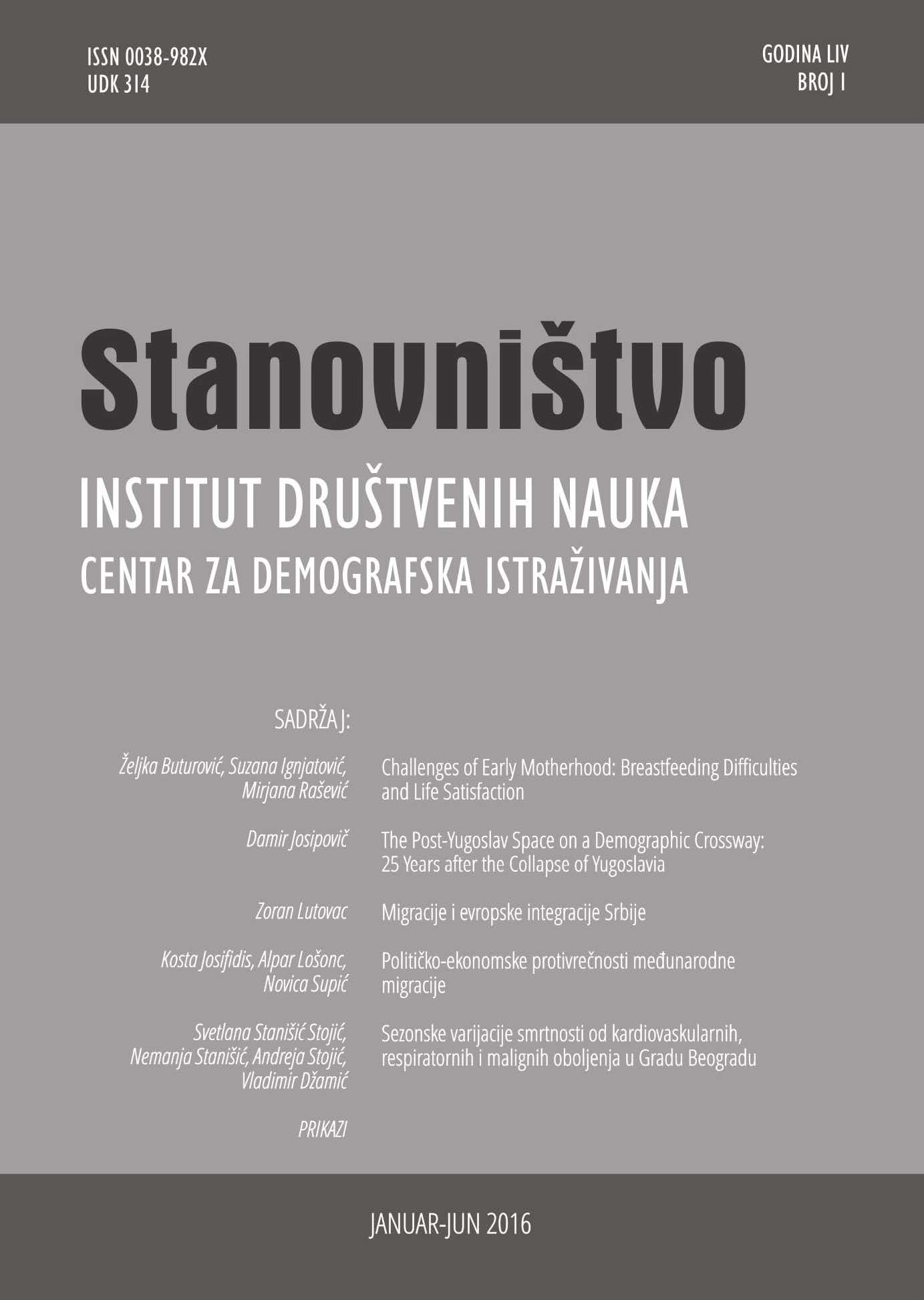
The political economy approach that entails critical arguments in relation to the processes of migration in neoliberal terms is developed in the paper. Starting with the account that migration covers as broad issues as politics, economics and population dynamic, the authors address the issue of migration in the political economy circuits of neoliberalization. In fact, the main line of argument is connected to the political economy as the relevant discursive frame and explanatory principle for the articulation of the complexity of migration. Critical arguments relating to the processes of migration in the neoliberal context thematize the mechanism of implemented flexibilisation and deregulation of labor. Demographic dynamics is essential in this context, but the authors intend to identify those political economy processes that lead to high precariousness, to various forms of temporary labor which are closely associated with forced labor forms. The category of forced labor is emphasized in the contemporary forms of migration, because this mode of labor facilitates the migration throughout the world. Furthermore, the authors point out the contradictory position of the state in relation to the migration-processes and analyse the authoritarian statism. This argumentation leads to articulation of the contradictory position of neolibe-ralization. The neoliberal discourses bring out the critical stance concerning the supremacy of the state, but it plays a key role in the regulation of migration. The state exposed to migration is faced with the contradictory demands. The globalization indicates the world without borders but is faced with the same contradictions. It is no coincidence that the intention of the reconceptualizations of globalization are interested in promoting global public goods. The processes of privatization in the sphere of the regulation of migration sharpen the contradictions of migration in the context of neoliberalization. The political economy approach is faced with the tension between the two approaches. The first proposed regulation and workforce management at the supranational level. The other remains in the framework of “methodological nationalism”: the appropriate starting point is the national state. Given the fact that structural inequalities should be recognized at a global level, and that processes of migration show that there is a certain hierarchical global flow in the context of the dynamics of workforce, the first approach proves to be inadequate. In other words, the second approach could not articulate the relevant tendencies. Accordingly, the political economy approach that intends to include complex determination regarding the migration should integrate the national trends in the supranational framework. But, proper research should take into account that globalization and its complex order consist of a number of interventions and interferences. This means that the aforementioned approach must develop sufficiently complex methodology in order to articulate its selected subject.
More...
Corporate governance beliefs generally employ the recreation of an essential role to determine business bankruptcy. Our research objective is to examine the relation between corporate governance related to the board structure and the bankruptcy of Thai IPO (Initial Public Offering) companies based on agencytheory. In this paper, we evaluate 272 companies consisting of 250 survivors and 22 non- survivors. We use the survival analysis by Cox and the proportional hazards technique to find a predictable bankruptcy pattern using our hypotheses. Our results indicate that the board size, the proportion of independent board members, the proportion of board committees, the leadership structure, the ownership concentration and the company age are statistically significant factors in decreasing the hazard of IPO bankruptcy. Otherwise, ownership concentration alone has an increasing risk effect on IPOs bankruptcy.
More...
Artykuł koncentruje się wokół problematyki zwolnienia z podatku od towarów i usług kształcenia zawodowego lub przekwalifikowania zawodowego. W tym celu dokonano szczegółowej analizy prawnej powszechnie obowiązujących przepisów prawa, a także ukazano wątpliwości interpretacyjne stanów faktycznych, występujących w praktyce podatkowej.
More...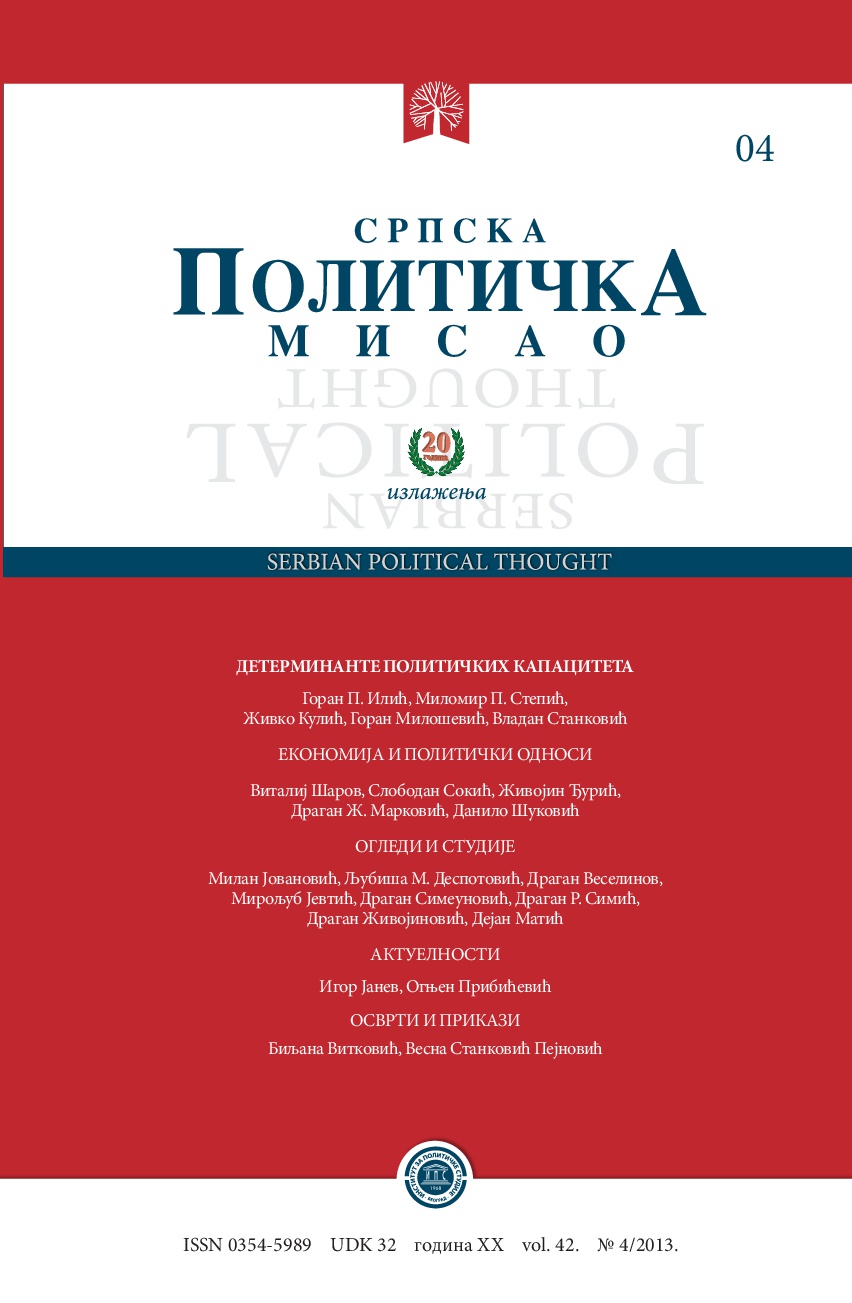
This essay deals with the theoretical attempt of Islamic authors to base economy named Islamic Economy. This one should be established as an alternative to global market economy and European liberal economic theory, as well as secular state and humanistic ethics. The subject of research of this paper is related to religious principles, scientific notions and economic policies applied by Islamic states and business companies. The essay ends by quoting Islamic authors expressing their different views of the essence of the Islamic economy and their assertions of non- existence of the Islamic economy yet.
More...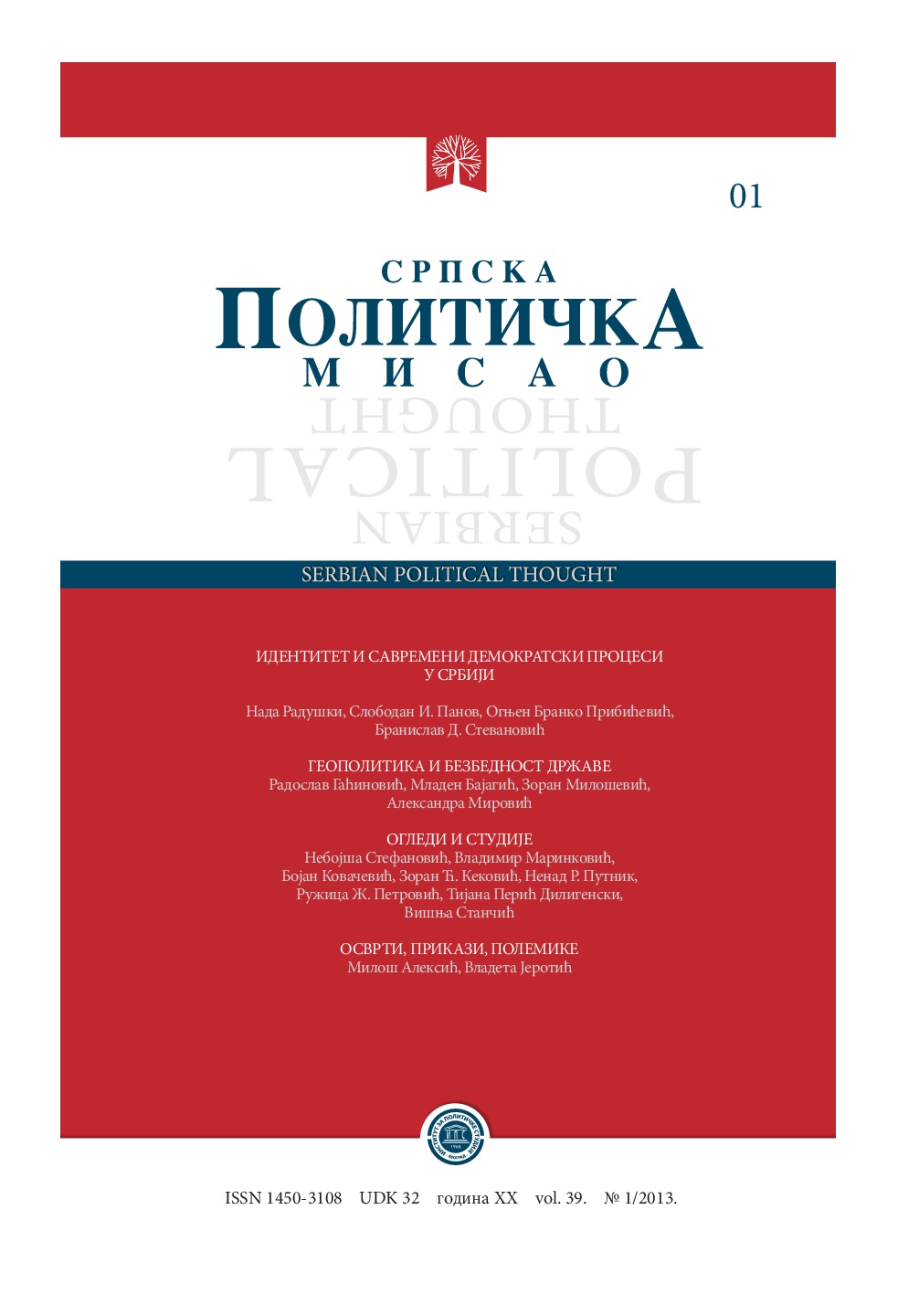
In principle, the democratic system tolerates any kind of deviations from the “normal” if it does not lead to violence or noninstitutionalized upheaval. In reality, however, economic liberalism and liberal democracy do not settle easily, which occasionally led to criticism of the very idea of tolerance. Criticism from the left, which claimed to have discovered the hidden ideological consequences of the principle of tolerance, is wrong- because it believes that the state of “repressive tolerance” can be overcome with some “new philosophy of community.” Again, like many times before as the solution is provided a nostalgic return to the community as a kind of “lost paradise” (but without democracy, freedom and individual rights, including moral). However, it is equally wrong to think that individuals can solely and completely independent from the society, to build a kind of “moral law”. Morality is an immanent need for society in terms of assets to curb the personal greed in favor to the imperative of collective life, and, in principle, has to be equal for all, or – it does not exist in any way. Solid limit of tolerance of all possible individual norms lay in the “paradox of tolerance” which states that highest degree of freedom imply that some freedoms have to be quite disabled, first of all- the “freedom” to destroy freedom itself. To be added to the previous also are the restrictions related to the symbolic survival of each specific socio- cultural system, including those who are considered to be “modern”, “open” and “democratic.”
More...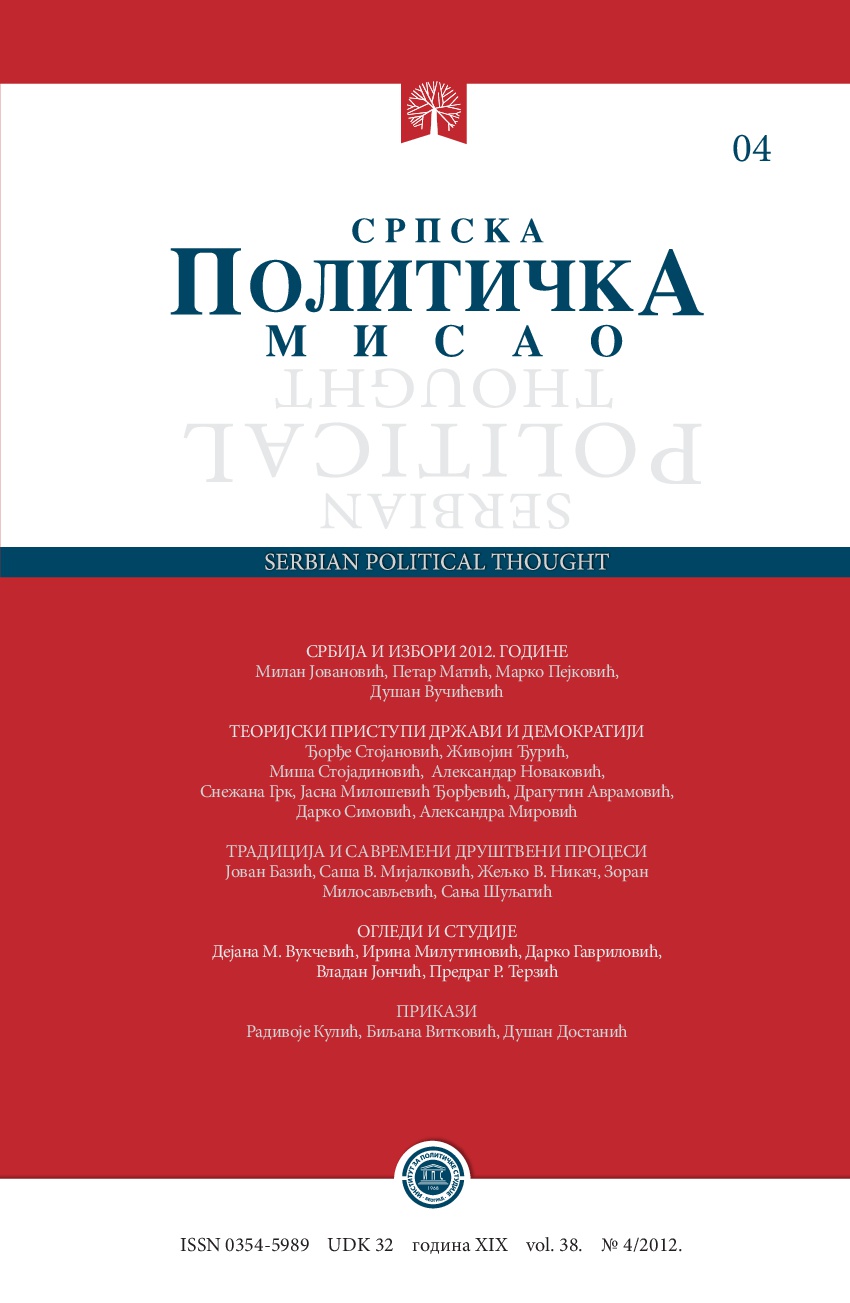
The term “neoliberalism” can not be understood without certain “theory of neoliberalism” that stands at its base. This does not refer to the theories of those authors who advocate free market, minimal state and the rule of law, but to the theory that use the word “neoliberalism” as an appropriate description of the political and economic realities of the world in which we live. In this paper, the scientific status of theory of neoliberalism is being critically reassessed in two ways: by demonstrating its contradictory character (discrepancy between theory of neoliberalism and empirical evidence) and by revealing its core motivation (theory of neoliberalism is being run by non-theoretical, ide¬o¬lo¬gi¬cal motives). In this sense, the paper presents various types of theories of neoliberalism, explains their genesis and indicates their mutual differences. Finally, through the investigation of several key determinants of political and economic organization of the modern state (the size of a modern state, the scope of welfare programs, the degree of government interference in the economy, the role of international organizations as well as the character of the transformation of the former Eastern bloc countries), it is shown why the theory of neoliberalism should be renounced of its scientific status.
More...
The Federal Republic of Yugoslavia has suffered the same fate as all other two-unit federations. The purpose of its creation was the desire of the state authorities in Belgrade to keep the continuity of the former state. In the negotiation process, each republic (i.e. party that was in power), wanted to create out of the federation what was most needed at the time. In the analysis of the political life of the federation, it can be seen two five-year periods. The first is the period that starts with its for-mation and lasts until the split in the Montenegrin ruling party. The main characteristic of that period was the paralysis of the federal system. There were almost no federal institutions that successfully performed its role during this period. The reason wasn’t only the powerlessness of these authorities to constitute and establish its authority, but also the obstruction of the authorities. The second period that can be identified starts with the beginning of the breaking of the federal coalition and lasts until the end of the federal state itself. When the Federal Constitutional Court appeared as a political ac-tor with the intention to resolve an intense electoral dispute in the smaller Republic, the constitution-al agreement on which the state rested: “there is no federal interference in the republic’s affairs” - was disrupted. The demolition of the constitutional/coalition agreement also meant the demolition of the entire state.
More...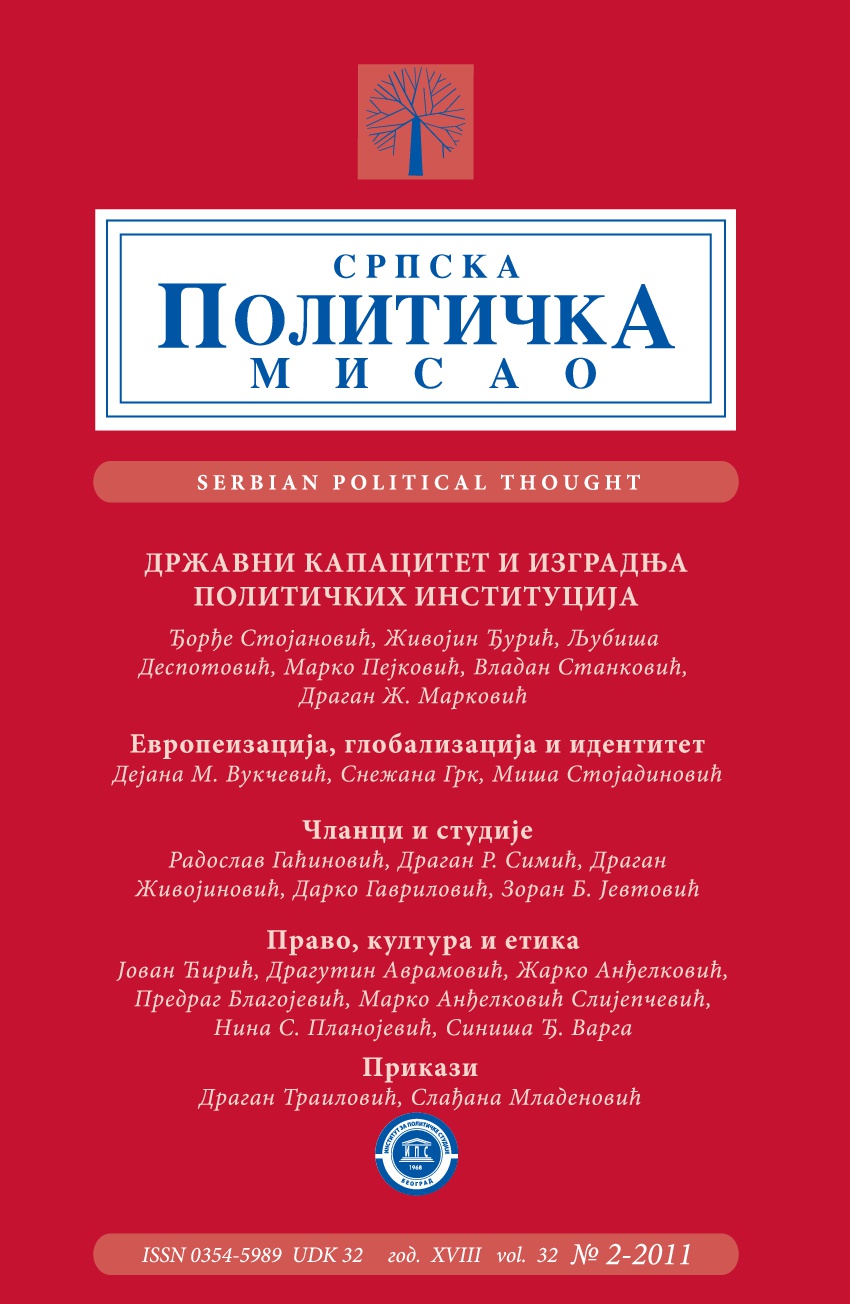
The first part of paper will try to define the political myths of liberalism and economic liberalism. The second part will be dedicated to the deconstruction of these myths and to the finding of appropriate examples. Throughout the work, especially in the last chapter, the author will show that the myths of liberalism were strongly attached to Christian teaching, not in order to support Christianity as a religion, but in order to take advantage of Christian matrix for own political purposes.
More...
In the text, ethics of journalism is considered as a complex area that include journalistic and editorial activities as well as activities of other participants in the processes of public communication who are able to state their opinions, ideas and programs influencing others. The focus is on content analysis of leading newspapers in the national information space and on identifying the ethical form by which the relationship between facts and moral dilemmas and ethical values, but also structural social and economic relations that determine changes in the mass media and political fields are established. The investigative journalism has no future in the industrial news production, while the interpretation of the facts are increasingly carried out in accordance with the expectations of powerful advertisers, political elites, PR agencies, interest groups and the invisible power centers. By content analysis of newspapers in Serbia, we note that in the context of social and political issues the desired plurality of opinion is missing. Good journalism is never threatened the technologies that have followed him, but poor quality (apologetic) reporting, ready to leave, for the sake of higher profits, to the classic standards of journalistic ethics.
More...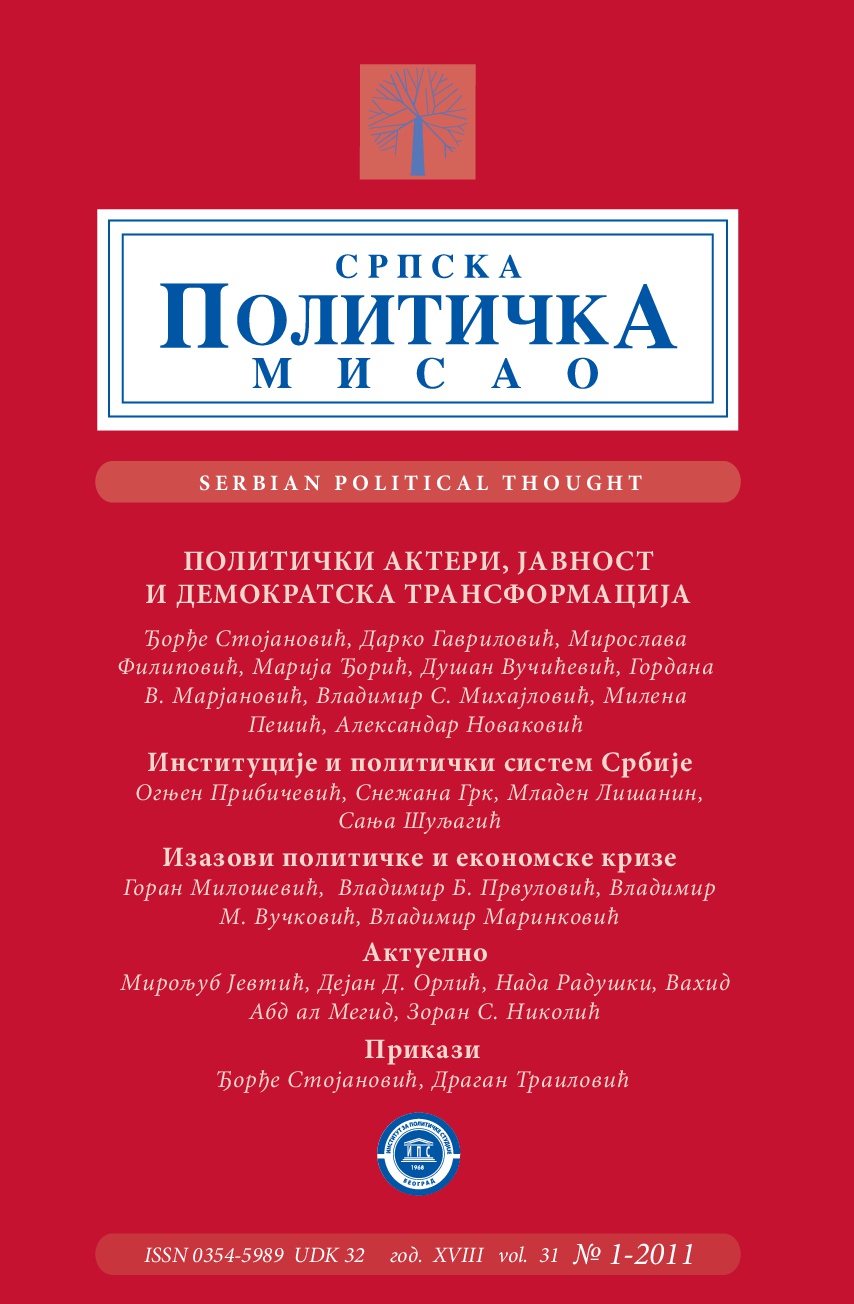
Development of modern macroeconomic theory is characterized by the existence of a large number of theories, with also a large number of items in each of them, which are often in conflict with each other. This paper presents the attempts to overcome these differences, guided by the principle of including the most important contributions of different theories within a single concept. In the middle of last century, it was the case with the neoclassical synthesis, while in recent years we can speak about creating a “new” neoclassical synthesis, which has some similarity with the previous core. The aim of this paper is to present the basic features of the new neoclassical synthesis, as well as to consider the question of the real contribution of this new concept in development of macroeconomic theory and policy.
More...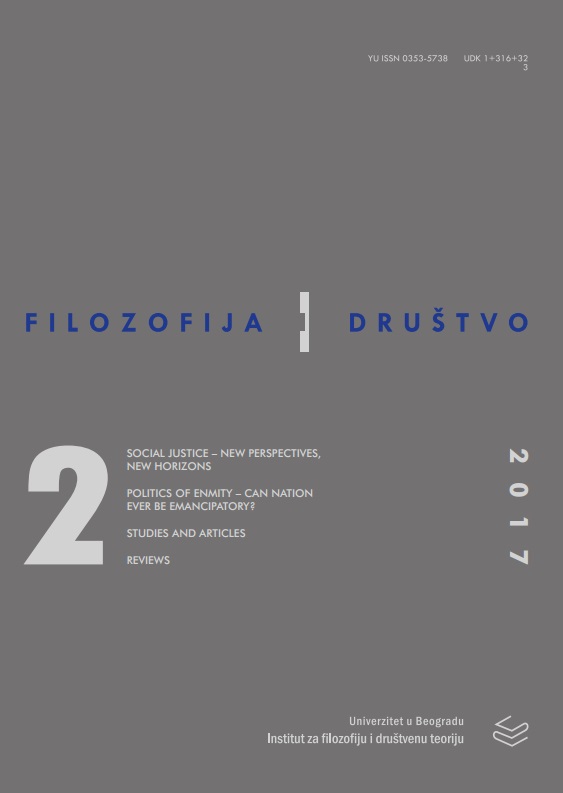
For almost half a century (between 1940 and 1990) the democratic and social state has solved the twofold problem of growth and social exclusion through social inclusion within the borders of the national state. This solution since the 1970s came under threat of multiple crises of the environment, secular stagnation, under-consumption, legitimization and constitutionalization. There might be a social solution of present crisis possible through massive redistribution plus decent basic income (on the level of tuition-costs) plus green growth. However, after globalization of capital there are no longer national social alternatives available. Therefore, there is no alternative to transnational democratic state-formation. But are there actors relevant, strong and motivated enough to do that?
More...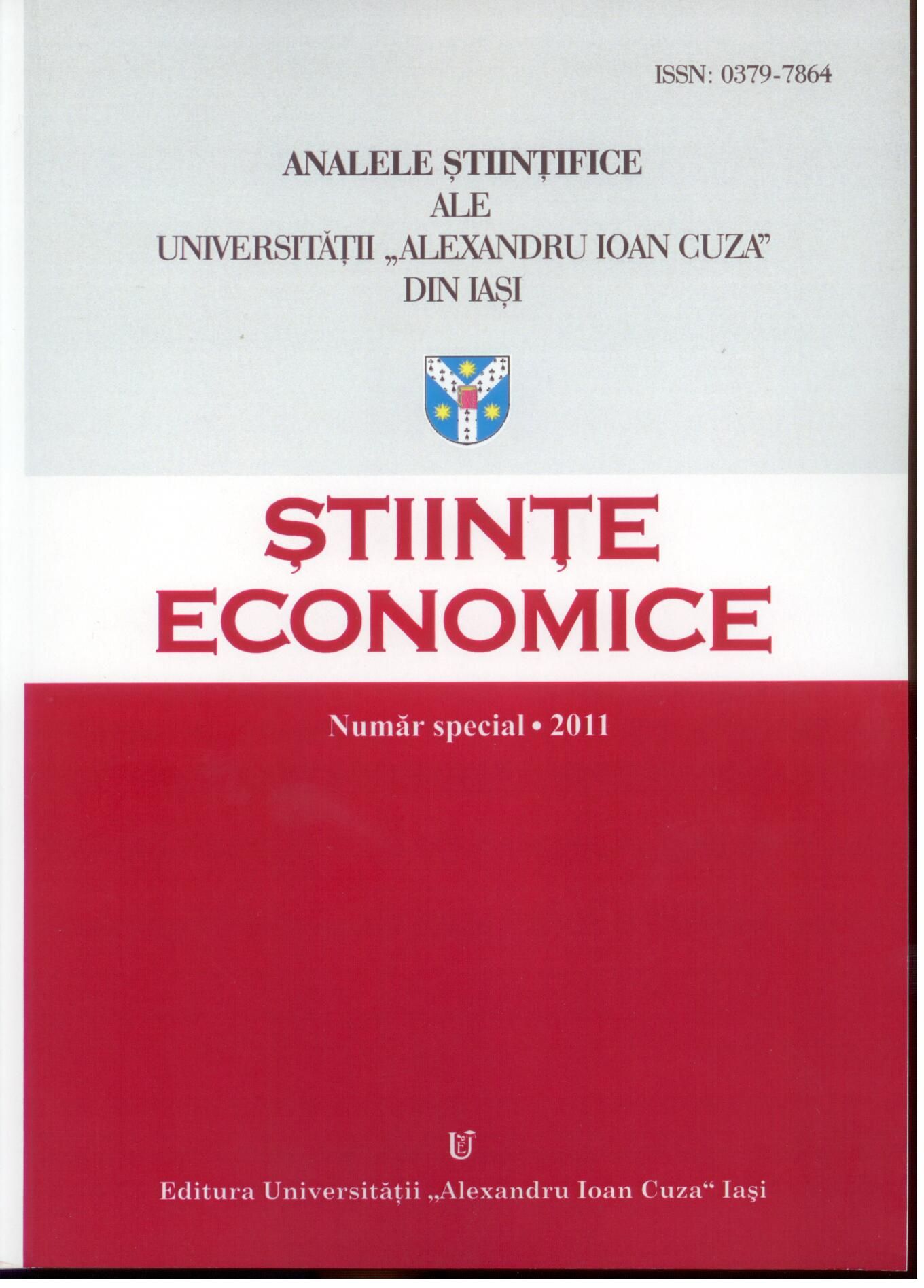
The paper analyzes empirically, in Romania’s case, the relationship between economic development (dependent variable) and its political factors (independent variables). The analysis is based on the construction of a linear “Logit Model” and the data set is covering the period 1926- 2007. The main results show that, in Romania’s case, which the economy has an expansive and competitive market, the economic development, can be accompanied, by high levels of democratization, with high political stability, on a republican base, but this is not a rule.
More...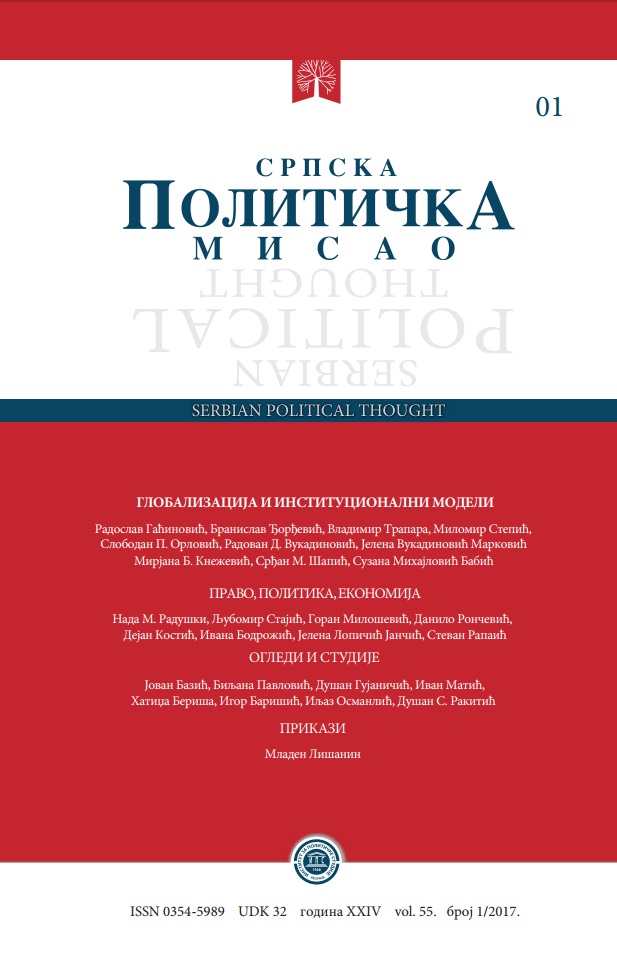
No government, no state, can afford to ease the economic and other activities take place outside of it. The country needs to assume a multitude of tasks, in order to establish the necessary community harmony in all spheres of social activity. No government, no state, can afford to ease the economic and other activities take place outside of it. The country needs to assume a multitude of tasks, in order to establish the necessary community harmony in all spheres of social activity. Economic security is a part of the function of the national security and it is a system of economic security for the country with the absence of a condition of any form of threat to the economic potential of the national economy. The essence of economic security is in the normal functioning of the economic system as a whole and the possibilities of conflict and normal involvement of business entities in the economic system. Hence, we can say that behind every policy stands economics and economics behind each security. Each State is trying to create its own internal and external priorities. Its domestic and foreign policy, as determined in accordance with national goals, basically regulate and create individual holders of political power in a given society. In terms of business, which is characterized by the free flow of people, capital and technology, the stability of the political environment in the country is one of the key conditions and factors that largely determines the socio-economic development of the country, but also the security situation.
More...
In the last two decades there was a lot of talk about FDI. This type of foreign capital has been presented to the public as the most effective tool in the fight against unemployment and poverty in Serbia. Considering that the impact of FDI is most visible at the local level, where you can clearly spot the differences in the quality of life of the local community, we decided to tie our research to local economic development of the city of Novi Sad. This city was chosen because it represents a positive example in attracting FDI, of which only the nonfinancial sector reached more than 2.5 billion euro. In this regard, our main research question was: Have 2.5 billion euro of FDI contributed to the economic development of the city of Novi Sad? We started our research with a thesis that there is no necessary causality between foreign direct investment and local economic development. This is contrary to the theory of the spillover effects. We believe that foreign direct investment would not, only by its very presence, cause spillover effects on the local economy. Using correlation analysis we managed to prove that FDI didn’t have any impact on the economic development of the city of Novi Sad. The values of coefficient of correlation between FDI inflow and indicators of economic development of the city of Novi Sad, unambiguously showed that there is no linear relationship between these two. As indicators of local economic development we used: demographic data, data on employment and wages, as well as data relating to the budget revenues of local government. The research was limited on the period since 2001, when the country began to liberalize its investment and trade policy, by the end of 2013. We concluded that in spite of existence of certain less significant impact on some of the indicators, there is no expressed link between FDI and economic development of the city of Novi Sad. Thus, the impact of FDI on economic development of the city of Novi Sad, in the period 2001-2013, is such that it can only be subsumed under the level of statistical error. After reviewing the analysis, there was a basic question: Why FDI worth up to 2.5 billion euro in the city of Novi Sad did not contribute to the local economic development? The answer to this question could be found in the structure of FDI, as well as the theory of spillover effects. This theory, presented in the paper, is separating two primary channels of technology transfer from FDI on the domestic economy. The first relates to the overflow in the supply chain, and the other in relation to domestic enterprises competitors. Sectors that the most FDI ended in Novi Sad are: real estate, retail, energy and insurance. In other words, those are the sectors where it was very hard to come to the transfer of technology and knowledge. More specifically, the manufacturing sector has been neglected, and the list of the biggest investors comes to four companies: BIG SEE that invested in shopping center, Mercator which invested in retail stores that sells consumer goods, Gazprom which has privatized national petrol company, and UnipolSai which privatized DDOR Novi Sad (insurance company). Only these four companies accounted for almost 2.2 billion euro in foreign investment.
More...
Review of: Title: Reconstructing urban economics: Towards a political economy of the built environment Author: Franklin Obeng-Odoom Publisher: ZED Books Place and year of publication: London, 2016 Number of pages: 296 [ISBN: 978-1-7836-0659-7]
More...